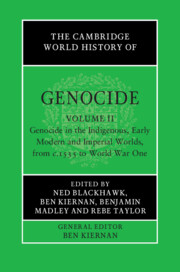Book contents
- The Cambridge World History of Genocide
- The Cambridge World History of Genocide
- The Cambridge World History of Genocide
- Copyright page
- Contents
- Figures
- Maps
- Tables
- Contributors to Volume ii
- Introduction to Volume ii
- Part I Settler Colonialism
- Part II Empire-Building and State Domination
- 4 A Case Lacking Contemporaneous Local Sources
- 5 Atrocity and Genocide in Japan’s Invasion of Korea, 1592–1598
- 6 The English Conquest of Ireland, c.1530–c.1650
- 7 Extirpation and Annihilation in Cromwellian Ireland
- 8 Genocide in the Spice Islands
- 9 ‘Too Furious’
- 10 The Destruction of Wendake (Huronia), 1647–1652
- 11 A ‘Spreading Fire’
- 12 The Qing Extermination of the Zünghars
- 13 A Vicious Civil War in the French Revolution
- 14 The Zulu Kingdom as a Genocidal and Post-genocidal Society, c.1810 to the Present
- Part III Nineteenth-Century Frontier Genocides
- Part IV Premonitions
- Index
13 - A Vicious Civil War in the French Revolution
‘The Vendée’, 1793–1795
from Part II - Empire-Building and State Domination
Published online by Cambridge University Press: 23 June 2023
- The Cambridge World History of Genocide
- The Cambridge World History of Genocide
- The Cambridge World History of Genocide
- Copyright page
- Contents
- Figures
- Maps
- Tables
- Contributors to Volume ii
- Introduction to Volume ii
- Part I Settler Colonialism
- Part II Empire-Building and State Domination
- 4 A Case Lacking Contemporaneous Local Sources
- 5 Atrocity and Genocide in Japan’s Invasion of Korea, 1592–1598
- 6 The English Conquest of Ireland, c.1530–c.1650
- 7 Extirpation and Annihilation in Cromwellian Ireland
- 8 Genocide in the Spice Islands
- 9 ‘Too Furious’
- 10 The Destruction of Wendake (Huronia), 1647–1652
- 11 A ‘Spreading Fire’
- 12 The Qing Extermination of the Zünghars
- 13 A Vicious Civil War in the French Revolution
- 14 The Zulu Kingdom as a Genocidal and Post-genocidal Society, c.1810 to the Present
- Part III Nineteenth-Century Frontier Genocides
- Part IV Premonitions
- Index
Summary
By March 1793 revolutionary France was at war with Austria, Prussia and Spain, and Britain was preparing a naval blockade. The National Convention responded to this desperate military situation by imposing a levy of 300,000 conscripts. In the west of France the levy was the trigger for massive armed rebellion and civil war, known, like the region itself, as ‘the Vendée’. The insurrection resulted in terrible loss of life before it was finally crushed in 1794. Estimates have ranged from exaggerated claims of 500,000 rebel deaths to more accepted recent estimates of up to 170,000 insurgents and 30,000 republican troops. The rebellion and its repression left deep and durable scars on French society and politics. In republican historiography, the scale of repression of the rebellion has been seen as a regrettable but necessary response to a military ‘stab in the back’ at the moment of the Revolution’s greatest crisis, whereas right-wing politicians and historians from the west of France have applied the label of ‘genocide’ to the repression and therefore to one of the foundation acts of the first French republic. This chapter argues that ‘the Vendée’ was not a genocide: huge numbers of people were killed, but not because they were a distinctive Vendéan people nor because they were devout Catholics. This was instead a brutal civil war studded with examples of atrocity which would later be known as ‘crimes against humanity’ and ‘war crimes’.
- Type
- Chapter
- Information
- The Cambridge World History of Genocide , pp. 312 - 334Publisher: Cambridge University PressPrint publication year: 2023



